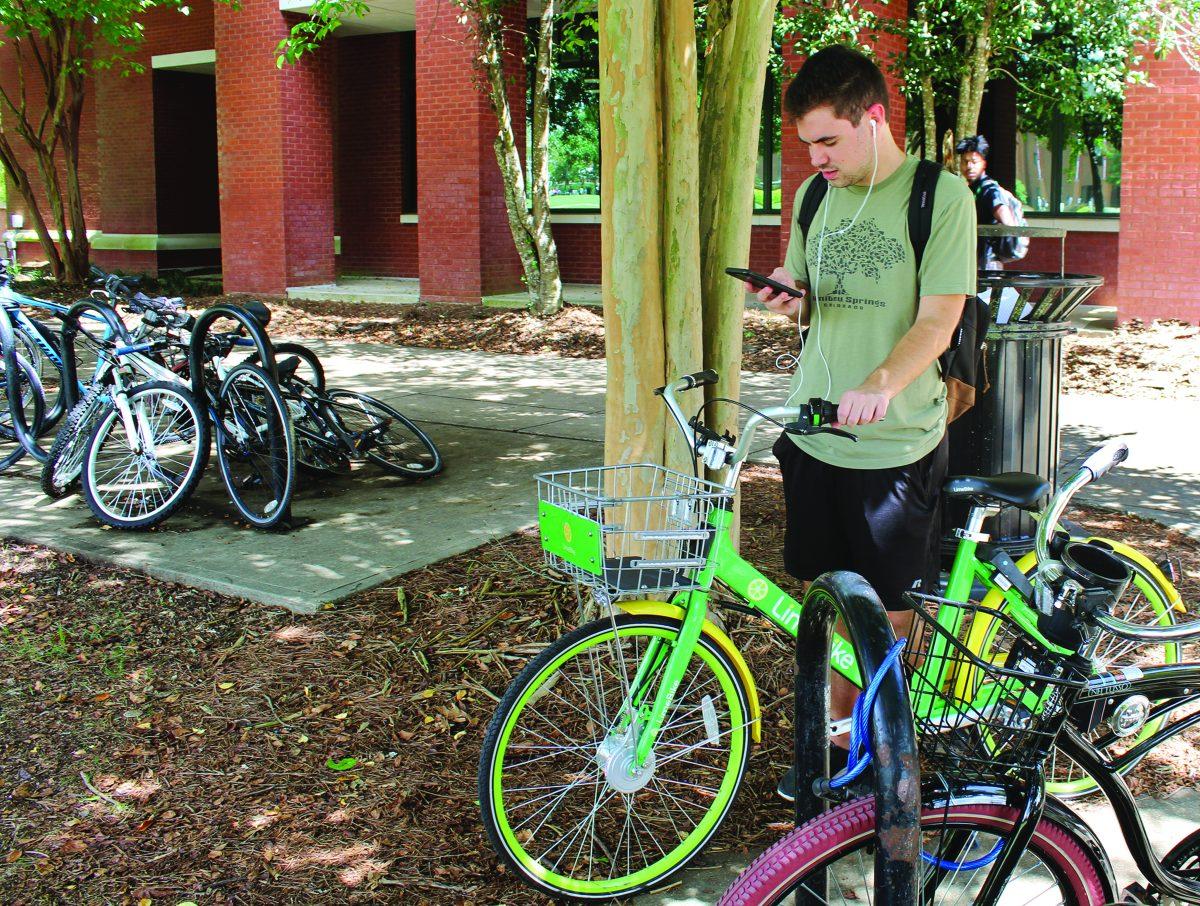As Mississippi State University begins the fall semester with its largest freshman class yet, the Department of Parking and Transit Services introduced a new method of transportation for students.
The Limebike initiative, now spread across campus, is a combination of new ideas and old. Currently, 250 Limebikes are located throughout MSU.
Lime is a fairly new company, launched in June 2017, and centered in San Mateo, California. Lime’s mission is improving urban sustainability through offering city and campus residents an affordable, efficient and green alternative to standard transportation methods.
It also aims to make everyday trips quicker, cheaper and healthier for Limebike riders with a fleet of smart bikes including GPS, wireless technology and self-activating locks. Lime is funded by Silicon Valley’s leading venture capital firm, Andreessen Horowitz.
Students can locate and access nearby Limebikes using the app, Lime. The cost to unlock a bike is 50 cents for students, a discount from the $1 fee other riders pay. App users can simply type in their credit card information to unlock a bike.
The bike is active for 30-minute durations.
Instructions are available in the app for how to complete a ride, including parking instructions. It is recommended to park the bikes between sidewalks and street curbs, or in a bike rack.
Jeremiah Dumas, the director of Parking and Transit Services, said the Limebikes are available for anyone looking to cross campus.
“Limebike is in place for anyone looking for a faster option of getting from one place to the next,” Dumas said. “Whether it is students between classes, faculty between classes, anyone going to lunch, etcetera, the bikes are meant as a means to help assist anyone efficiently move around campus.”
Dumas said Limebike was a profitable replacement to the department’s former bike share program, which once offered students free bikes to use for their transportation needs. The previous bikes were growing older and required more and more maintenance.
Parking and Transit Services said they also enjoyed Limebike’s business model and the bikes themselves.
Another benefit of the new bike-share program is its positive action toward a more environmentally-conscious campus. Christine Lashley, MSU’s sustainability coordinator, said she is excited to present students with another way to travel, while decreasing environmental impact.
“The new bikes will definitely help MSU to be more environmentally friendly by reducing our use of gasoline on campus,” Lashley said. “Burning one gallon of gasoline creates 20 pounds of carbon dioxide, so every ride on a bike makes a difference.”
Another bonus the bikes offer is the ability to be parked all across campus. Riders no longer have to walk back to their cars—instead, they can unlock the nearest Limebike and leave it in a location of choice.
Michael Seymour, a professor and graduate coordinator at the Department of Landscape Architecture, is teaching a First-Year Experience (FYE) course this semester entitled “Bike to the Future.”
He believes the new bike-share program is an excellent opportunity to promote more active transportation methods and prevent campus green space from being converted to parking lots and roadways.
Utilizing Limebikes is also another way to address climate change and reduce car use, which Seymour considers a step in the right direction. The professor hardly uses his car anymore because he finds biking so gratifying.
“I hope that a lot of people will try out the program because I’ve found bike riding to be a really enjoyable and efficient way to get around campus and Starkville,” Seymour said. “Any investment in biking is an investment in the health of our students, faculty and staff.”
Parking and Transit Services also acknowledges the strain such a large number of students places on parking. Personal vehicles are becoming less of an option for students traveling across campus.
Riding a bike instead of driving is another car off the road, as well as another available parking spot. Though the department said it does not want to entirely eliminate this form of transportation, it does want to improve every method to better benefit students. The Limebike program is the department’s first step toward an environmentally-friendly and fast-traveled campus.
MSU introduces new bike-share program
MSU introduces new bike share program
0
Donate to The Reflector
Your donation will support the student journalists of Mississippi State University. Your contribution will allow us to purchase equipment and cover our annual website hosting costs.
More to Discover













